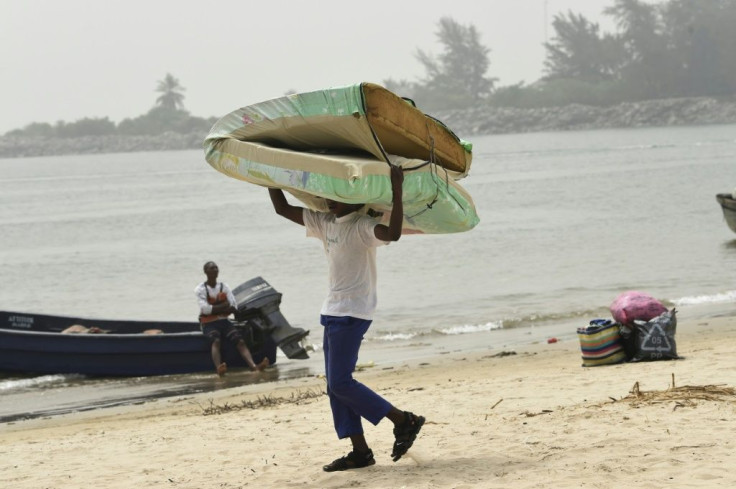Lagos, Nigeria’s Ban On Motorcycles Spell More Misery, Headaches For Huge City’s Poor Residents

KEY POINTS
- Lagos is a megacity of at least 21 million people
- Lagos suffers from poor infrastructure, undependable public transit and political corruption
- Africa is an important market for Indian motorbike manufacturers
Some Indian motorcycle manufacturers are watching developments in Nigeria following a decision by government officials to ban motorbikes and tricycles from most of the teeming, overcrowded capital of Lagos, a megacity of at least 21 million people.
Bajaj Auto Ltd. and TVS Motor Co. Ltd. export many motorcycles to Nigeria, and other African countries. Analysts are not overly concerned yet – unless the ban is extended to other cities across Africa.
“The ban will have more of sentimental impact than any direct impact on sales. The sentiment will be negative if the ban expands to more cities,” said independent analyst Ambareesh Baliga. He added that since Bajaj Auto and TVS export their bikes to many countries, the impact of Lagos will be limited.
Bajaj Auto reportedly exports about 50,000 to 55,000 motorcycles to Nigeria every month, with Lagos accounting for 6% of this volume. On the whole, Nigeria accounts for 25% of Bajaj Auto’s total foreign sales. In January 2020 alone, Bajaj Auto exported a total of 174,546 motorcycles.
Rakesh Sharma, executive director at Bajaj Auto, said that the company’s international business contributed about 43% to the company's net sales. Africa, led by Nigeria, Congo, Uganda and Ethiopia, recorded a sales growth of 15% year-on-year in the third quarter of fiscal 2020.
“As things stand now, we are not anticipating any major impact [from the Lagos ban],” Sharma said. “This kind of thing keeps happening in international business; Bangladesh did it last year. So it’s not a significant event from our perspective, not for Nigeria and not for international business. So I don’t see any reason to be circumspect about the future of Nigeria in our portfolio.”
Although motorcycles – known as “okadas” -- were a popular way to beat Lagos’ horrendous traffic, city officials banned them due to the high number of fatal accidents they cause. Lagos traffic also suffers from excessive speeding and poorly maintained roads. Some residents of Lagos have to endure four hour-long commutes to work each way.
Gbenga Omotoso, the Lagos State information and strategy commissioner said the ban was designed to “protect Lagosians from the negative effects of these illegal modes of transportation.”
Oluwatosin Ajani, a Lagos-based economist, said he thinks the ban might dissuade investors from considering Nigeria.
“In time, these things will factor into the ease of doing business index and Nigeria will fall back down in the rankings,” he warned. “[Due to] terrible government policy, there will be little to no investment in the country and Lagos as a city.”
Adetayo Bamiduro, the co-founder of Metro Africa Express, or MAX, a Nigerian mobility platform that connects users to professional motorcycle-taxi drivers through a mobile app, said Lagos is a very important market for mobility tech companies.
“We have conversed with the government at different times and helped come up with frameworks to see the problems of the informal transport system and how to enforce safety,” he said.
The motorcycle ban in Lagos has sparked widespread protests in the megalopolis, given that millions of residents find themselves stranded and cannot afford their own cars.
A light rail transport system is not even expected to be introduced until 2022 and only recently began a ferry service.
“Quite simply, existing state-owned bus and ferry transport services alongside private operators of commercial transport buses cannot cater to the transport needs of the city’s 21 million residents,” reported Qz.com.
Lagos resident Folarin Bosun said the government’s ban threatens poor people who need motorbikes to get around. “Whatever the plan is, it’s not going to be good enough,” he said.
Chinedu Azodoh, cofounder of Max.ng, an on-demand motorbike hailing and delivery service, agreed that the ban represented “a restriction on poor people.”
Fahim Saleh, founder of Gokada, a motorbike hailing service headquartered in Lagos, called the ban “disappointing.” “We don’t know how it’s going to be enforced,” he added.
Gokada estimated that about 8 million okada drivers operate across Nigeria. Many of them are likely to lose their jobs.
“The [ban] is extremely harsh and anti-people as the ban will leave hundreds of thousands without any visible means of livelihood,” said Tony Ademiluyi, a journalist. “Which alternatives did the government create for these people who have been operating under harsh circumstances? The railways are not working at optimal capacity while water transportation is still in infancy. Commuting [in Lagos] is worse than hell on earth.”
Muda Yusuf, the director-general of the Lagos Chamber of Commerce and Industry, warned that the price of transportation in Lagos will skyrocket if the ban on motorcycles is maintained.
“One of the biggest challenges of urbanization is traffic congestion. This is more so in a state like Lagos which has the largest population and the smallest land size in the country,” Yusuf said. “The growth in the number of vehicles has consistently outpaced the road capacity. The proliferation of the commercial motorcycles and tricycles in Lagos state are manifestations of the shortcomings of the transportation system in Lagos state.”
Yusuf added that enforcement of the law will have “profound social, economic and political costs.”
“Commuters would suffer untold hardship as there is no immediate alternative to fill the gap which the wide-ranging restriction would create,” he concluded. “There would be high transportation cost as commuter buses hikes their fares. They would naturally take advantage of the surge in demand. There is also the investment effect on emerging innovative investments in the commercial motorbike sector some of which have invested billions of naira in the sector.”
© Copyright IBTimes 2025. All rights reserved.





















